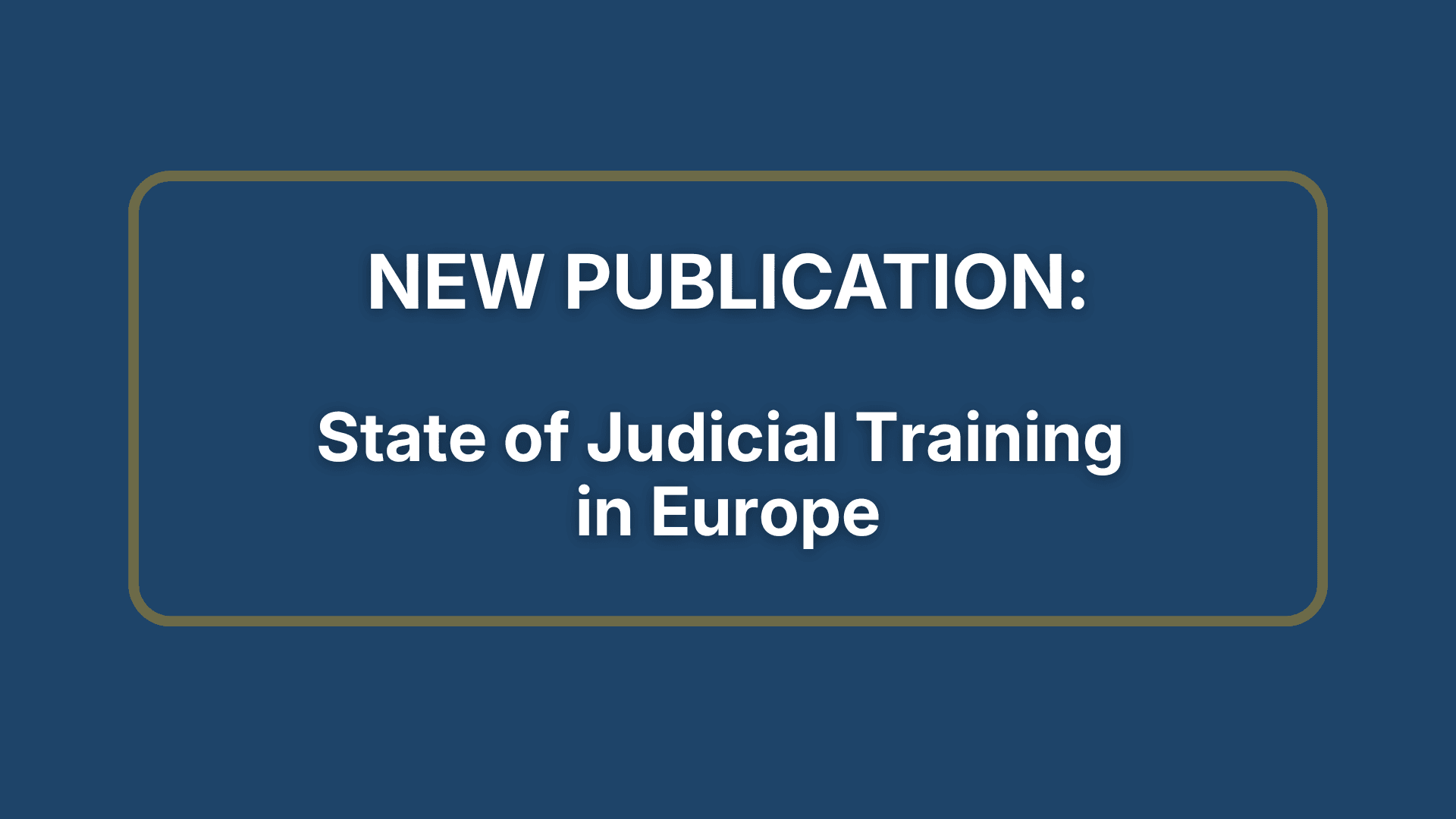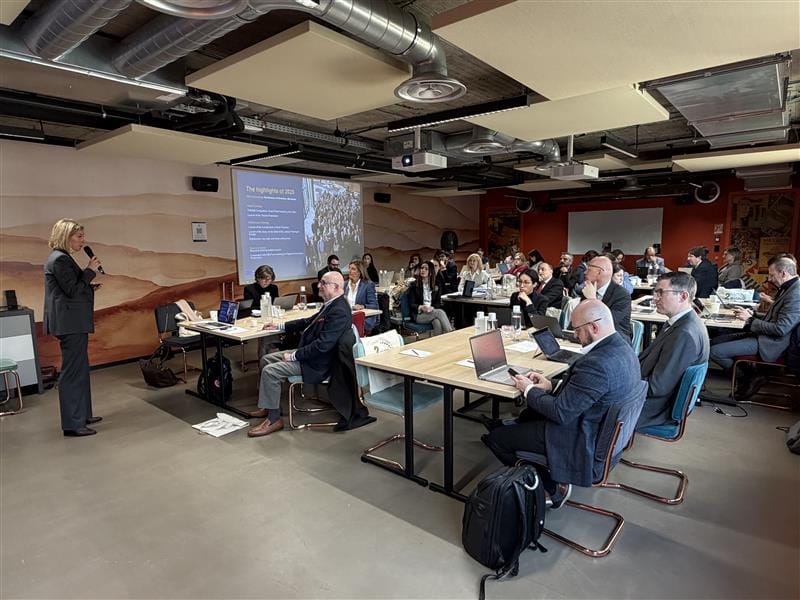On 11-12 June, the European Judicial Training Network organised its 2025 General Assembly under the Polish Presidency of the Council of the European Union and with support from the Polish EJTN member National School of Judiciary and Public Prosecution. The event took place in Gdańsk, Poland.
Over 100 delegates, including directors of EJTN Members, Associate Members and Observers, as well as representatives of key partners and esteemed guests, attended this year’s General Assembly. Discussions centred on matters related to EJTN’s governance, stakeholders and the planning of 2026 activities, as well as timely topics such as education against disinformation. Moreover, the delegates confirmed the Latvian Judicial Academy as the member succeeding the Latvian Judicial Center.
The EJTN Steering Committee Chair Remco Van Tooren delivered the 2024 Steering Committee report. In his remarks, he highlighted the progress made across various areas, including the EJTN Green Deal policy, the work of the EJTN Financial Committee, and updates to the EJTN Articles of Association, among other topics.
EJTN’s five Working Groups (Digitalisation, Exchange Programme, Judicial Training Methods, Linguistics, Programmes) also shared an overview of their accomplishments in 2024 and highlighted their plans for the future.
Elections: Secretary General, Steering Committee and Working Groups
On the first day of the General Assembly, elections were held for the positions of the EJTN Secretary General, members of the EJTN Steering Committee as well as Conveners of EJTN’s five Working Groups. The mandate for all roles starts on 1 January 2026 and runs until 31 December 2028.
The EJTN Secretary General, Judge Ingrid Derveaux was re-elected to lead the Network for another 3-year mandate.
“I am deeply honoured by your trust, confidence and support in re-electing me as the EJTN Secretary General. I want to express my sincere thanks to all EJTN members for this renewed mandate. It is a privilege to continue serving our Network, and I look forward to working closely with all EJTN stakeholders in the years ahead.
I am confident that together we will continue to advance our shared mission of delivering judicial training excellence and promoting a strong, independent and well-prepared judiciary across Europe. Our collective efforts will help strengthen the Rule of Law and the core European values of equality, freedom, democracy and fundamental rights,” Judge Derveaux highlighted in her speech after the election.
The following nine institutions were elected to become members of the EJTN Steering Committee:
- Belgian Judicial Training Institute
- Dutch Training and Study Centre for the Judiciary
- Federal Ministry of Justice of Germany
- Italian School for the Judiciary
- Portuguese Centre for Legal Studies
- Romanian National Institute of Magistracy
- Slovenian Judicial Training Center
- Spanish Centre for Legal Studies
- Academy of European Law
The following five institutions were elected as Conveners of EJTN Working Groups:
- National School for the Judiciary (ENM) from France as the Convener of the Working Group on Digitalisation
- Judicial Training Institute (IFJ / IGO) from Belgium as the Convener of the Working Group on Exchange Programme
- Centre for Judicial Studies (CEJ) from Portugal as the Convener of the Working Group on Judicial Training Methods
- Judicial Academy from the Czech Republic as the Convener of the Working Group on Linguistics
- Judicial School from Spain as the Convener of the Working Group on Programmes
Fostering dialogue with key judicial training stakeholders and honoured guests
Representatives and guests from key organisations and institutions interacted with the delegates and had a chance to contribute their insights into the future training needs of judges, prosecutors and court staff across the EU.
Thank you to the European Commission, the Court of Justice of the European Union, Eurojust, the HELP Programme of the Council of Europe, the European Union Agency for Asylum, the European Union Agency for Fundamental Rights, the European Association of Judges for Mediation (GEMME), the European Judicial Network (EJN), the European the European Law Institute (ELI) and the Association of European Administrative Judges (AEAJ) for active participation and contributions.
Moreover, we want to thank the honoured guests who joined us at the General Assembly to share their insights on the state of European justice: Dariusz Mazur, Deputy Minister of Justice of Poland; Maciej Szpunar, First Advocate General of the Court of Justice of the European Union; Stanislas Adam, Legal Secretary at the Court of Justice of the European Union; Wojciech Postulski, a representative from the European Commission; Aleksandra Dulkiewicz, Mayor of Gdansk; Emil Rojek, Vice Governor of Pomorskie Voivodeship; Agnieszka Baranowska, Member of the Board of the Pomeranian Voivodeship; Waldemar Żurek and Izabela Fountoukidis, Deputy Directors of the Polish National School of Judiciary and Public Prosecution, as well European Commissioner Michael McGrath and Minister of Justice of Poland Adam Bodnar, who delivered video messages.
In her welcome address, the EJTN Secretary General Ingrid Derveaux highlighted the continued importance of judicial training for upholding the Rule of Law across Europe:
“For a quarter of a century, our Network has stood at the heart of European judicial cooperation, strengthening mutual trust among justice practitioners, fostering a shared legal culture, and ensuring that our judges, prosecutors, court staff and judicial trainers are not only well-trained, but deeply connected by our common values of independence, impartiality, the Rule of Law and human rights.
We gather at this General Assembly not only to reflect but also to shape the future of European justice. […] In a world of uncertainty, polarisation, and growing threats to the Rule of Law, judicial training is more critical than ever. Independent, well-informed and ethically grounded justice practitioners are the guardians of our democracies.
Let us honour the past, not only by remembering, but by learning. Let us serve the present, not only by training, but by connecting. And let us shape the future, not only by voting, but by leading with courage, integrity and vision.”
In his intervention, Director Piotr Girdwoyń noted:
“In today’s Europe, the Rule of Law and democratic values face growing pressure from disinformation, political interference and erosion of public trust. This makes judicial cooperation and shared training more essential than ever.
Institutions like EJTN and national schools help equip judges and prosecutors with the tools to uphold justice independently and effectively. Beyond training, they also foster a sense of solidarity. When justice practitioners from across Europe connect and support one another, they form a strong, united front in defending our common legal and democratic foundations.”
European Commissioner for Democracy, Justice, the Rule of Law and Consumer Protection Michael McGrath underlined in his video message the importance of judicial training in succeeding with the digital transformation of justice:
“At this crucial moment, national and EU policymakers alongside practitioners – judges, prosecutors and judicial staff – are united by one shared ambition: to make our justice systems more efficient, more accessible and more resilient to digital transformation.
Your role as judicial training providers is crucial here. We count on you as strategic partners in shaping the future of digital justice in Europe. Europe is facing geopolitical challenges with far-reaching effects for our security, our democracies, and our economies. Therefore, our justice systems need to play their part by being a source of trust and stability. Digitalisation is a necessity. The European Commission recognises this and supports it fully.
The new European Judicial Training Strategy 2025-2030 will be presented jointly with the digitalisation of justice strategy. It will have a strong focus on digitalisation and will thus place training at the heart of this transformation. But the EU institutions cannot do this alone. We need a collective effort with Member States and all stakeholders of the judicial training community. We welcome the work undertaken by EJTN to date.”
The First Advocate General of the Court of Justice of the European Union, Maciej Szpunar, underlined the role of new technologies in his intervention:
“New technologies constitute an immense challenge for national judges and the Court of Justice.”
Wojciech Postulski, a representative from the European Commission DG JUST, reflected on the future of judicial training in his keynote speech:
“We are at a pivotal juncture in judicial training policy. A new European Judicial Training Strategy is emerging, with fresh priorities being shaped and future funding frameworks under discussion. In this context, the European Judicial Training Network is called upon to play a central role: coordinating national training efforts in line with EU priorities, fostering synergies between EU-supported and nationally funded programmes, and ensuring structured communication between EU and national training bodies.
EJTN must continue to uphold the qualities that have made it unique: a commitment to evidence-based quality, a proactive stance towards emerging challenges, cost-effective operations, and a truly pan-European reach serving judges, prosecutors and court staff across all EU Member States.”
In his intervention, Stanislas Adam, Legal Secretary at the Court of Justice of the European Union reflected on the important partnership between EJTN and the CJEU:
“EJTN and the CJEU have significantly reinforced their partnership over the past few years, on the basis of the Memorandum of Understanding signed in 2016. Activities under that partnership cover the long-term training periods within cabinets of the Court and of the General Court, regular study visits of judges, prosecutors and court staff in Luxembourg, and an annual seminar on the reference for a preliminary ruling.
All these activities significantly contribute to raising awareness among national courts about procedures before EU courts and the role of the latter in ensuring the coherent interpretation and application of EU law. The cooperation intensifies, however, as the Court is increasingly conscious of the role of EJTN not only as a ‘transmission belt’ enhancing proficiency in EU law among national courts, but also as a unique platform for developing a genuine European judicial culture.
Especially through its active participation in EJTN’s annual Training Needs Assessments and the development of new digital training tools for use by all national institutes for judicial training, the Court thus endeavors to strengthen its support to EJTN in fulfilling its core missions.”
Looking to the future
The next EJTN Conference of Directors will take place in connection with the EJTN 25th Anniversary Event on 14-15 October in Bordeaux, France. The 2026 General Assembly will be hosted under the future Cypriot Presidency of the Council of the European Union.
***
EJTN wants to thank the Director of the Polish National School of Judiciary and Public Prosecution Piotr Girdwoyń and his team for their professionalism and dedication in the organisation and delivery of this year’s General Assembly.




